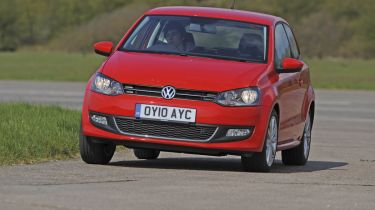Volkswagen Polo 1.2TSI
VW hopes clever new turbo will give baby hatch the boost it needs
The Volkswagen Polo has always lived in the shadow of its hugely successful Golf big brother. Previous models have failed to live up to the promise of its stablemate, with uninspiring styling and so-so handling.
The latest version got off to a low-key start in its first test in Issue 1,080. But can the 1.2 TSI step out of the shadows and steal the spotlight?
Video: watch CarBuyer's video review of the VW Polo
[[{"type":"media","view_mode":"content_narrow","fid":"68451","attributes":{"alt":"","class":"media-image"}}]]
Pronounced wheelarches, a thin, horizontal grille and swept-back headlamps all contribute to a purposeful look. The shape of the new Polo was overseen by the firm’s head of design, Walter de Silva. His back catalogue includes the gorgeous Audi R8, Volkswagen Scirocco and Alfa Romeo 156, and while the Polo doesn’t quite match these cars for style, its muscular appearance provides grown-up appeal which the Renault struggles to match.
It’s a similar story inside. Both cars feature high-quality, soft-touch dashboards, but the Polo’s interior has a more driver-friendly layout. It’s packed full of classy materials and very well put together.
Our test car’s optional Alcantara and leather seats cost an extra £815, but they add a little luxury and provide excellent lateral support – something which is lacking in the Clio. Neat touches include a leather-covered handbrake, steering wheel and door inserts, which all help to make the Polo’s cabin more appealing than the Renault’s.
Used - available now

2022 Kia
Sportage
19,817 milesAutomaticDiesel1.6L
Cash £24,500
2021 Volvo
XC40
71,870 milesManualPetrol1.5L
Cash £17,800
2020 Nissan
Qashqai
35,084 milesAutomaticPetrol1.3L
Cash £14,700
2021 Ford
Fiesta
69,057 milesManualPetrol1.0L
Cash £10,500There’s also a superb range of seat and steering wheel adjustment, while the logical audio and ventilation controls are located high up and within easy reach of the driver.
There’s little to separate the duo on practicality, as both models can comfortably seat five adults. The Volkswagen has a more versatile boot which has a completely flat load area when the rear seats are folded. But when it comes to outright space, the Clio holds a slender 76-litre advantage.
Although the two cars have virtually the same engine sizes, the Volkswagen’s 1.2-litre trumps the Renault for performance. As our figures show, our tests were a one-sided affair. In the sprint from 0-60mph the
Clio trailed by 1.4 seconds – with a time of nine seconds exactly – and the Polo emerged victorious from all of our in-gear acceleration runs. Particularly telling is the 50-70mph time in top gear, which reveals a 5.3-second gulf in performance between the six-speed VW and five-ratio Renault.
This is largely thanks to the star of the show – the clever new TSI engine. It was designed to replace the manufacturer’s ageing 1.4-litre unit and is a real gem. Not only is it smooth and lively, but it also packs plenty of mid-range punch.You could easily be forgiven for confusing it with a much larger, normally aspirated engine, and after driving these two cars back-to-back the Clio feels resolutely pedestrian.
It’s only in corners that the Volkswagen begins to struggle. It turns in precisely and generates plenty of grip, but the over-light steering provides limited feel. Ultimately, it does not offer the same excitement you get from the entertaining Clio, but it’s well balanced and gives plenty of confidence behind the wheel.
The Polo holds one more trick up its sleeve, because it’s cleaner and slightly more economical. The latest model is lighter than the version it replaced – but it’s not exactly cheap, which is the VW’s biggest problem here.
In top-spec SEL trim it costs over £1,000 more than the Clio, although our experts predict it will hold on to much more of its value. Plus, the sparkling new engine isn’t available in a lower, more affordable trim level.
The more expensive Polo offers superior fuel economy, a more luxurious cabin and desirable badge. But will that be enough to convince buyers in the hugely competitive supermini sector?
Details
Chart position: 1
WHY: The Polo has a mature new look, and in SEL guise, it's stylish, too. The 1.2 TSI engine in our car replaces the old 1.4-litre, and promises a 20 per cent improvement in economy.







